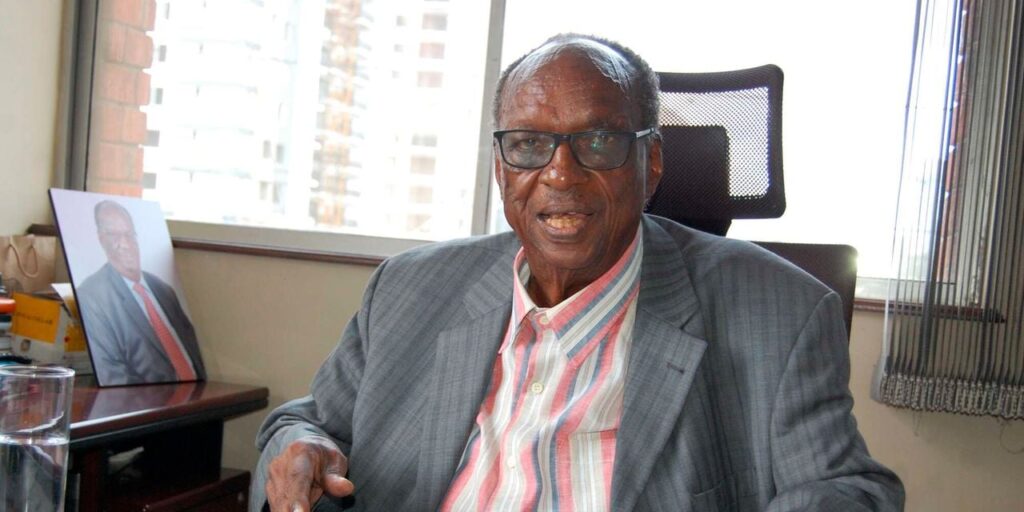Share this
How Matu Wamae helped to build an elite circle of Mt Kenya millionaires
It was in Parliament. City millionaire Eliud Matu Wamae had stood to speak against the raging corruption within Kanu when an unidentified Kanu member shouted a reminder from Kenya’s history of sleaze: “Wamae! ICDC!”
 The snide remark caught him flat-footed. He got disoriented and looked around like a man seeking help. Then as he digested the remark, he got enraged, lost his temper and then shouted: “I am willing to have anybody come to me and say anything about ICDC. I am proud of what I did in ICDC!”
The snide remark caught him flat-footed. He got disoriented and looked around like a man seeking help. Then as he digested the remark, he got enraged, lost his temper and then shouted: “I am willing to have anybody come to me and say anything about ICDC. I am proud of what I did in ICDC!”
History, with all its unkind reminders, had caught up with him.
Depending on whom you ask, it was at the Industrial and Commercial Development Corporation (ICDC), where Matu Wamae, who died this week, made his mark. It was also the place he soiled his name and turned into a millionaire within a short period.
ICDC was the citadel of capitalism, cronyism and all that was right and wrong with the Jomo Kenyatta regime. Then, it was a state within a state: the playground of the elites, who owned the elephants and the republic.
Thus, such jibes became common as long as Wamae was in the House. He became a point of reference. At one point in 2002, Raila Odinga, when comparing the corruption in the Jomo Kenyatta government and that of President Daniel Moi, said: “My friend, Hon Wamae, was only ‘eating’ the profits that he made at the Industrial and Commercial Development Corporation (ICDC) … but the government officers did not ‘eat’ the principal capital.”
At only 31, Wamae became the personification of Ploutos – the god of wealth in Greek mythology. He was the doorstep to riches and the darling of local investors. Wamae was Mr Moneybags and the king of parastatals. If you knew him in the 70s, you were on the trajectory of wealth — and on the right lane. And again, once you had passed through Wamae, you had also crossed the Rubicon of poverty and want.
Many elite families today with links to old money owe their fortunes to him.
In the 1970s, Wamae was the man in charge of building Kenya’s middle class and getting Africans into the league of millionaires as captains of the industry. That can never be taken away from him – and he will be mourned as such. How he did it and which section of the Kenyan nation he favoured is another story.
As the head of the most prestigious state parastatal – the capitalist arm of the Kenyatta government from 1969 to 1979, Wamae was what African investors were looking for. His board of directors could write off loans, and they did. His office was the dreamers’ paradise as the man in charge of Africanising commerce and industry in the country during the Kenyatta reign. But ICDC only oiled the ruling elites’ interests and helped those within the inner circle sustain and realise their dreams.
Read: New KCC boss Matu Wamae refutes Sh1.7 billion loss claims
When ICDC was set up, its stated aim was to provide loans for indigenous Kenyans to establish or expand their businesses. Its other role was to finance the buy-out of Asian companies in major towns and create a middle class. By then, the Kenyatta government had started to intimidate Indians to leave or hand over their retail businesses to indigenous Kenyans. The takeovers were not civil, and there were allegations of favouritisms and corruption in the choice of who would inherit the vacated businesses.
Dr Julius Gikonyo Kiano, for instance, as the minister for Commerce, had carved a zone in downtown Nairobi for takeover by Murang’a business people. It became known as “Little Murang’a”.
ICDC dished out capital
As ICDC dished out capital, it became apparent that some of the ‘investors’ had difficulties distinguishing credit from income, and soon their businesses collapsed and were bought by the Asians. Some took loans and felt no obligation to repay them. The ICDC, in what became a practice on some elite loans, would write off the loans, which set a bad precedent followed by other government-run institutions such as the Agriculture Finance Corporation, which gave loans to farmers from 1969 — and then wrote them off.
ICDC was Matu Wamae, and Matu Wamae was ICDC. And for many years, he was its face as the executive director. In that position, Wamae sat on the boards of various parastatals where ICDC had put its money or where the Industrial Development Bank (IDB), which he chaired, had put its coins. If the Kenyatta state is accused of running a vehicle for the state control of the economy, then the man at the helm was Wamae.
The ICDC bought stakes in all the leading companies — East African Breweries, EAI, Pan Paper Mills, Firestone, Block Hotels, NAS Airports Services, Union Carbide, Kenya Wine Agencies, Hilton Hotels, Uchumi Supermarkets, and many others. He was determined to get a 50-50 share in large commercial ventures, and through his prowess, the government acquired controlling interests in companies such as East African Power and Lighting and Mombasa oil refinery.
Read: Untold story of Kenyatta-era fluorspar cartels, sabotage of Marakwet factory
But he was also accused of corruptly giving Firestone East Africa, which was manufacturing and importing specialist tyres, duty exemptions and a monopoly on local production. Other large projects by ICDC included the 1974 joint venture with British Leyland and the Bruce McKenzie-led Cooper Motor Corporation, which was building a plant in Thika to assemble Land Rovers, trucks, and Volkswagens. He also signed a deal with Tiny Rowland and another deal with General Motors to start more assembly plants.
The architect of this strategy – and they came to office at the same time – was Mwai Kibaki, who had been appointed the minister for Finance and Economic Planning in 1970. ICDC emphasised centralised planning and state investment in industries, tourism, agriculture, and infrastructure. The socialists, especially in the 1970s, thought ICDC was too capitalist, while the capitalists in the 90s thought ICDC was too socialist.
Historical problems
ICDC had a few historical problems. A few years after it was established, it soon became apparent that 64 per cent of its small industrial loans and 44 per cent of commercial loans since independence and up to 1968 went to Central Province businessmen. ICDC never explained whether this was due to their high level of mobility, political connection, or greater commercial focus. But ICDC created economic inequalities in its construction of elite firms.
Personally, Wamae invested wisely too. He owned beach plots at the coast, and since ICDC was financing the takeover of the hospitality sector, he got a slice of the fortune. In Nairobi, he owned the Ngong Hills Hotel while in Mombasa, he was part of the elites who owned the Kenya Beach Hotel.
He also helped the likes of Kenneth Matiba, Eliud Mahihu, Isaiah Mathenge, and many other Mt Kenya elites to have a stake in the tourism sector. Those who could not use Kenyatta State House links to get rich sailed through ICDC and its many arms.
In 1973, under Wamae’s watch, ICDC established the Industrial Development Bank (IDB), whose goal was to finance large industrial projects.
When he was not intimidating investors to sell their shares to the government, Wamae was all over the world looking for opportunities. But, in a rush, and for being everywhere, ICDC made some mistakes that it could never correct. For instance, it invested in various white elephants that were not paying dividends and later became avenues of sleaze, wastage, and patronage.
On paper, ICDC seemed to be making money, but between 1964 and 1977, it did not pay any dividends. There is no explanation for where the money went – or why such a huge entity did not make profits. ICDC paid its first dividend after Kenyatta’s death but only for a few years before it went south.
The level of sleaze was so profound that after the 1975 murder of popular Nyandarua MP J M Kariuki, who used to complain against ICDC’s determination to create millionaires at the expense of millions of Kenya, Parliament decided to establish an anti-corruption select committee headed by Butere MP Martin Shikuku. The members declared their wealth first, which was a first in Kenya’s history. But before it started its work, the committee was disbanded on June 24, 1975, by the same Parliament that had established it. From then, it appeared that Parliament, as an institution, could no longer check on Executive excesses.
Patronage and nepotism
After that, as historian Charles Hornsby observed: “Patronage and nepotism were increasingly the way business was done. If you did not know someone, then the business would be very difficult. It was common for politicians to ensure that allies, friends, relatives, and people from the same ethnic group and sub-group as themselves received jobs or contracts, which would provide them with income and in turn buttress the politician’s career.”
And this is the world in which Matu Wamae operated. ICDC would put money in companies whose shareholders read like a registry of senior civil servants and politicos. The likes of Ben Gethi, Charles Njonjo, Daniel Arap Moi, Julius Gecau, Jeremiah Kiereini, Philip Ndegwa, Mwai Kibaki, Bruce Mckenzie, and many others made hundreds of millions within a short period.
In these circles, the elites set up banks and financial institutions and Wamae would help them access business from the government parastatals under him. The Nyeri group, for instance, operated under the Continental Bank and Continental Credit Finance, which used to give loans to the local politicians until it ran into liquidity problems. The CBK claimed that the directors had loaned themselves more than Sh300 million. Wamae topped the list.
It was further claimed that these institutions, including Andrew Ngumba’s Rural-Urban Credit, which was big in Kiambu and Nairobi, had always relied on funds from parastatals that had been set up under the ICDC — and that Wamae had a hand in the banking deals. Whether that was true was never known. But after Kenyatta’s death, President Daniel Moi used that as an excuse to kill the banks by ordering parastatals to only do business with government banks. It was his way of scattering the elite empire that Wamae had built.
Postscript: Matu Wamae later became a Democratic Party MP and was appointed by President Mwai Kibaki to snatch back the Kenya Cooperative Creameries (KCC), which had been grabbed by President Moi. It was payback time.





















